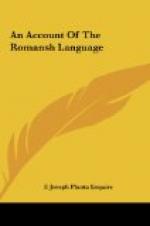Produced by David Starner, Brett Koonce and PG Distributed Proofreaders
[Handwriting: F. Druce, the gift of the author.]
An Account of the Romansh Language.
By Joseph Planta, Esq. F. R. S.
In a Letter to Sir John Pringle, Bart. P. R. S.
[Handwriting: Phil. Trans. vol LXVI. A.D. 1776]
British
Museum,
June 30, 1775.
Sir,
The Bible lately presented to the Royal Society by Count de Salis, being a version into a language as little attended to in this country, as it may appear curious to those who take pleasure in philological inquiries; I embrace this opportunity to communicate to you, and, with your approbation, to the Society, all that I have been able to collect concerning its history and present state.
This language is called Romansh, and is now spoken in the most mountainous parts of the country of the Grisons, near the sources of the Rhine and the Inn. It consists of two main dialects; which, though partaking both of the above general name, differ however so widely as to constitute in a manner two distinct languages. Books are printed in both of them; and each, though it be universally understood in its respective district, is yet sub-divided into almost as many secondary dialects as there are villages in which it is spoken; which differ, however, but little except in the pronunciation. One of the main dialects, which is spoken in the Engadine, a valley extending from the source of the Inn to the frontiers of the Tyrolese, is by the inhabitants called Ladin. It admits of some variation, even in the books, according as they are printed either in the upper or the lower part of this province. The abovementioned Bible is in the dialect of the lower Engadine; which, however, is perfectly understood in the upper part of that province, where they use no other version. The other dialect, which is the language of the Grey, or Upper. League, is distinguished from the former by the name of Cialover:[A] and I must here observe, that in the very centre, and most inaccessible parts of this latter district, there are some villages situated in the narrow valleys, called Rheinwald, Cepina,[B] &c. in which a third language is spoken, more similar to the German than to either of the above idioms, although they be neither contiguous, nor have any great intercourse with the parts where the German is used.
It being impossible to form any idea of the origin and progress of a language, without attending to the revolutions that may have contributed to its formation and subsequent variations; and this being particularly the case in the present instance, wherein no series of documents is extant to guide us in our researches; I shall briefly recapitulate the principal events which may have affected the language of the Grisons, as I find them related by authors of approved veracity.[C]




